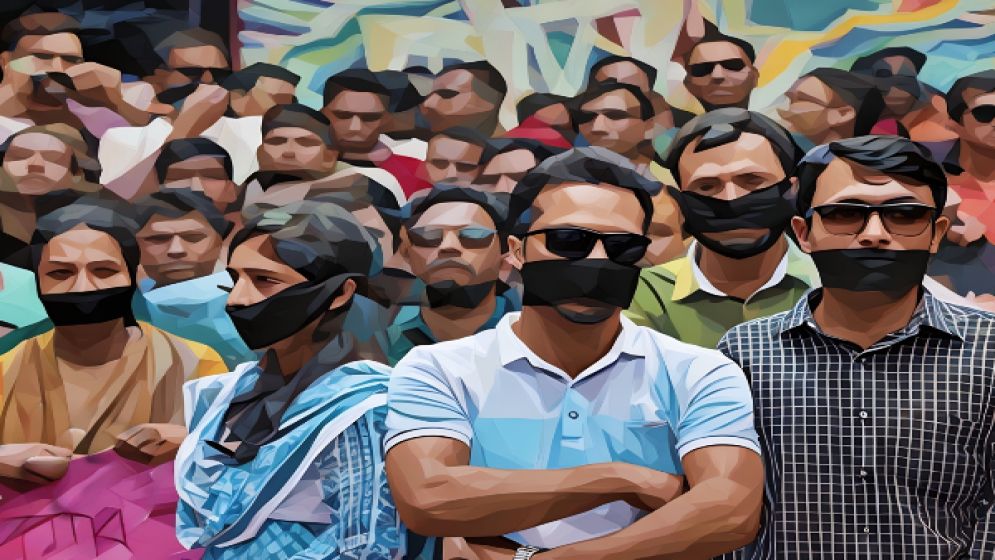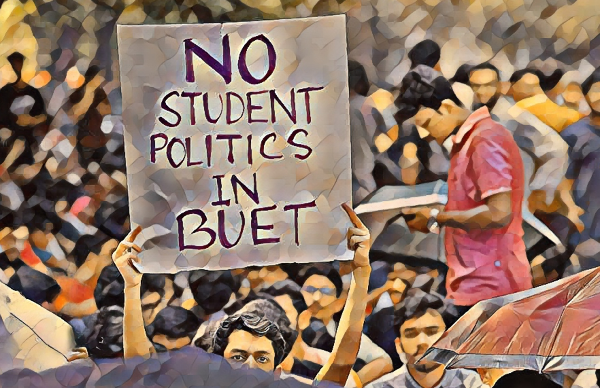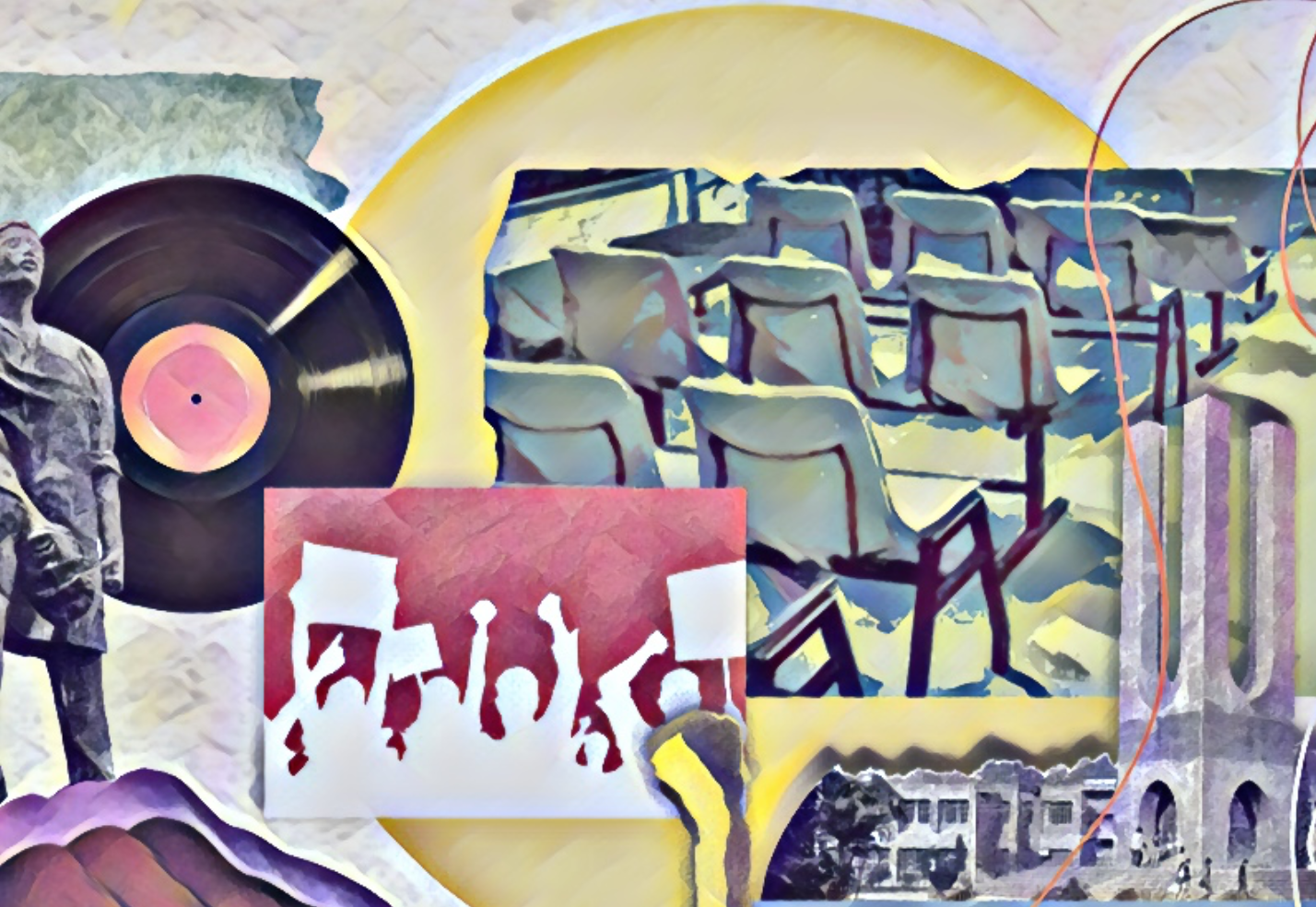Breaking the cycle: The need to ban student-teacher politics

The recent student movement has underscored the widespread desire among students to put an end to outdated student politics in this country.
The movement stayed peaceful until certain “helmeted” factions from student organizations stepped in, leading to visible consequences across the nation. Can the oldest student organization which has a storied past, evade responsibility for the resulting loss of life?
There is no doubt that Bangladesh has a truly glorious history of student politics. But whose history is it, really?
History has shown us that success has always come when everyone has united, regardless of their political affiliations. Government-supporting student organizations have consistently stood in opposition to this unity but failed.
Whether it was the Muslim League before independence or the current student league, the trend has been consistent. It’s a fact that since the anti-autocracy movement of the '90s, student politics has increasingly revolved around party interests.
Even in democratic periods, these organizations maintained a degree of control, particularly with an eye on future elections.
Prior to '96, there was a general sense of unity among students, but after that, government-backed student organizations started taking control of university halls. The ruling party now has a monopoly on universities, a situation that persists today.
The Bertelsmann Transformation Index (BTI), a German assessment, categorizes Bangladesh as an autocracy. History demonstrates that in autocratic regimes, partisan teachers and student politics lead only to harm and destruction.
Unfortunately, our country serves as a contemporary example of this reality.

Undue power vested upon students
Let’s start with an example. The authority to allocate seats in university dormitories rests solely with the Provost. However, teachers often find themselves submissive to those in power due to their political affiliations, with the exception of collecting funds.
In the past, a few seats were set aside for members of other political parties, but that practice has since vanished.
Now, a "guest room culture" prevails, where students are coerced into attending rallies and meetings. Additionally, all university tenders are shared among themselves.
Students are not only provided with rooms but also granted significant power, which is something many desire at this age. They engage in everything from local extortion to drug dealing, showing no reluctance to fight among themselves for dominance.
While conflicts within their group might be manageable, anyone who criticizes their party risks violent repercussions. Talented individuals like Fahad have lost their lives, and countless others, though not dead, have endured severe suffering, often going unheard.
Many who acquire this significant power often lose sight of their primary focus—studying—due to their connections with senior figures.
If you examine the list of repeat-year students at universities, you'll find that 99% of them are engaged in student politics. Securing a position on a committee requires substantial financial contributions. How many of them actually manage to ascend the power hierarchy?
It is commonly believed that being a student leader in the ruling party's organization facilitates job opportunities. A survey is needed to assess how many individuals truly benefit from this. Even if they do gain an advantage, can it be considered legitimate?
Even teachers have not been spared from their abuses. The recent death of Professor Dr. Selim from KUET is a stark reminder. A review of the past 20 years across all public universities reveals that not a single institution is free from such tragedies.
The number of injured is countless, and these accounts do not even include the latest incident. So why should we tolerate this blatant disregard?

How responsible are the teachers?
Until now, I've focused on student politics, but teachers are equally involved. To expand their influence, even subpar students and teachers integrate into their networks. There are no clear rules or regulations regarding appointments.
Numerous stories circulate about the relentless pursuit of becoming a VC; while not all may be accurate, the reality remains. There have been many violent incidents at Dhaka University, yet the Proctor has spoken like a party leader.
They have failed to serve as proper guardians for the students. When was the last time a member of the ruling party faced consequences? It's said that a portion of every tender goes to the teacher leaders, a practice that has persisted for years.
Do teachers recognize that they are losing the respect they once had from students? Yet, what is respect worth in the face of power? Didn’t they see how the public ridiculed them during their recent pension protests, reflecting how people view them now?
The primary responsibility of teachers is research. In many countries, the more articles a teacher publishes in journals, the greater their respect. What about here? In our context, power seems to correlate with closeness to the government.
Teachers lack individual initiative and tangible results. There’s no updated syllabus, no significant research output. The government should inquire why a nation of 200 million is falling so far behind in research.
Public universities serve as the main avenue for higher education for most people in this country. In the past, students were quick to protest against any increase in government fees, but that spirit seems to have faded.
Talented students who aspired to become teachers through hard work now feel hopeless without political connections. Numerous costly projects are launched, yet the funds often end up mismanaged, leaving the lab standards at Dhaka University even lower than those of private institutions.

What initiatives are truly taken to
break the status quo?
Have we ever heard calls for improving our university rankings? In reality, the common goal appears to be exploiting education for personal gain, with little concern for others' welfare. There's a clear lack of empathy.
BUET has always held a distinct place in Bangladesh, being the first to successfully establish a campus free from student politics.
This led to a decrease in failure rates among students and an increase in journal publications, along with improved food quality in dormitories.
But let's set BUET aside for a moment. None of the top 600 universities worldwide have partisan student politics. Have we forgotten our history, or do those countries truly lag behind us in development?
Before advocating for student politics by referencing the past, consider this: while battles once required foot soldiers, is that still the case today? Change and evolution are essential in every aspect of life, particularly in education.
Yes, these universities have various associations aimed at developing leadership skills, addressing student needs, and negotiating with administration to meet those needs. Partisan politics is unnecessary for this.
Currently, many universities are banning all forms of student and teacher politics, although not all have made formal announcements yet. As a result, when things return to normal, these political parties are likely to attempt to re-enter the campuses.
If professional political parties are present, they will resist any ban on student politics for their own interests. Therefore, to address this issue effectively, the government should implement an executive order banning such activities.
Additionally, the new constitution should clarify where partisan politics can be permitted.
Our current young generation has demonstrated that they can rise to the occasion without any political affiliation. Despite the ruling party’s attempts to label them as Jamaat-Shibir, the truth is that most people recognize they have never needed a political party in the past, nor will they in the future.
The essential quality of education should now be the ability to identify what is good and what is bad, and our students embody this principle.
Therefore, it is crucial for us to move away from destructive student-teacher politics and focus on building a nation rooted in education and equality.
If we take this step, you will notice improvements in our university rankings and the country’s standing on the democratic scale.
—-
Subail Bin Alam is a columnist focusing on sustainable development issues.

